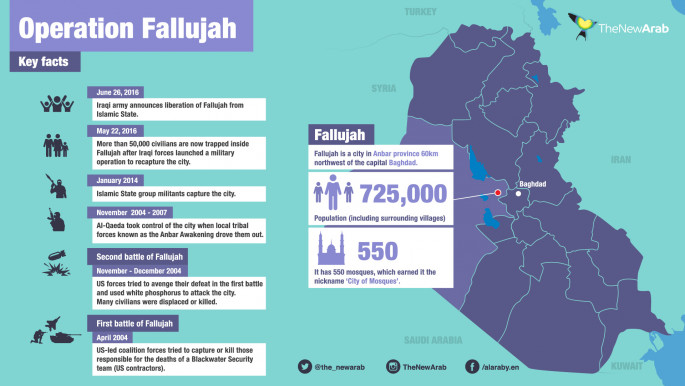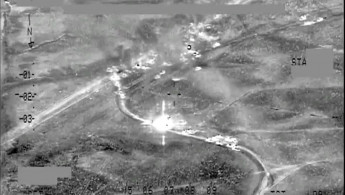Airstrikes destroy convoy of IS vehicles fleeing Fallujah
A series of air raids killed at least 150 Islamic State [IS] militants driving a convoy of over 260 vehicles out of recently-recaptured Fallujah on Wednesday, officials said on Thursday.
The airstrikes, which commenced on Tuesday, destroyed hundreds of vehicles carrying weapons and ammunition out of the city, the Joint Operations Command said.
"Our heroes in the military aviation destroyed more than 200 vehicles," JOC spokesman Yahya Rasool said.
At least 150 IS militants were killed in the strikes, although it was not clear how the dead were counted and identified, Rasool said.
Commandos had also seized large quantities of weapons and ammunition, he added.
Rasool's comments relate to a first series of strikes on a massive convoy of several hundred vehicles heading south of Fallujah toward the desert, apparently to areas IS still controls near the border with Syria.
At least another 60 IS vehicles were destroyed later by airstrikes conducted by Iraqi and US-led coalition aircraft on a convoy heading northwest of Fallujah, Anbar Operations Command chief Ismail Mahalawi told AFP.
He could not provide an estimate for the number of IS fighters killed in the strikes but US officials told Reuters at least 250 IS fighters were killed in the attack.
Iraqi forces have retaken full control of Fallujah, an emblematic jihadist bastion just 50 kilometres [30 miles] west of Baghdad, after a vast operation that was launched in May.
After tough battles to breach IS defences in south Fallujah, elite Iraqi forces conquered the rest of the city with relative ease.
They took full control of the city on Sunday after IS fighters abandoned the Jolan neighbourhood without firing a shot in anger and retreated to rural areas to the west.
The account of the air strikes provided by the JOC suggests IS fighters had no other choice but to attempt a suicidal convoy, which they knew would leave them exposed to air strikes.
According to Rasool and other military sources, the first strikes broke up a massive initial convoy that stretched several kilometres [miles].
 |
Agencies contributed to this report.





 Follow the Middle East's top stories in English at The New Arab on Google News
Follow the Middle East's top stories in English at The New Arab on Google News
![The UAE is widely suspected of arming the RSF militia [Getty]](/sites/default/files/styles/image_330x185/public/2024-11/GettyImages-472529908.jpg?h=69f2b9d0&itok=Yauw3YTG)
![Netanyahu furiously denounced the ICC [Getty]](/sites/default/files/styles/image_330x185/public/2024-11/GettyImages-2169352575.jpg?h=199d8c1f&itok=-vRiruf5)
![Both Hamas and the Palestinian Authority welcomed the ICC arrest warrants [Getty]](/sites/default/files/styles/image_330x185/public/2024-11/GettyImages-2178351173.jpg?h=199d8c1f&itok=TV858iVg)